Maybe you want to say “thank you” to the waiter that just served you a nice coffee in Lisbon? Or maybe you want to thank a friend for an invitation?
So, in this article, I’m going to make it clear for you how to say “thank you” in Portuguese, confident that you are going to sound natural.
How to thank someone in Portuguese?
As you probably already know, the most used word to say thank you in Portuguese is “obrigado” (thank you) or “obrigada” (thank you).
But, when should we say “obrigado” and when should we say “obrigada”?
Well, in fact, it’s very simple. Women should always say “obrigada” (thank you) and men should always say “obrigado”. And that’s it! Pretty simple, right?
If you want to put more emphasis on the fact that you are VERY grateful, you can say: “muito obrigado” (thank you very much). If you are a woman you can say: “muito obrigada” (thank you very much). In case you want to put even more intensity, you can use the superlative: “muitíssimo obrigado/a!” (Thank you so much!). All these ways to say “thank you” are very natural and frequently used.
When can we use the word “obrigado/a”
The word “obrigado/a” can be used in any situation, either a formal or an informal situation. So, if you want to keep it simple you can always use “obrigado/a” and you can be sure that it sounds very natural.
But of course, as in any other language, we also have ways to say “thank you” in a more informal way. For example, you can say “obrigadão” (It’s like saying: “a big thank you”). Or you can use “obrigadinho”.
So, as the example I mentioned at the beginning of this article, let’s say that the waiter is serving you a nice coffee and you want to say “thank you”. Since this is a formal situation (assuming that the waiter is not your friend) you could simply say “obrigado” (thank you), or “muito obrigado” (thank you very much).
But what if you want to thank your good old friend Manuel for inviting you to a party at his house. You can use a more informal way by saying “Obrigadão Manuel” (like saying: “Thanks a lot Manuel”).
How can we answer?
Now, let’s consider what you should say when someone says “obrigado/a” (thank you) to you. Well, the most common way to answer is by saying “de nada” (You’re welcome). This answer literally means “of nothing”. So, it suggests that you don’t consider what you did as something that caused you any trouble because, in fact, it was a pleasure for you to be able to help.
But there are other forms that you can use. For example: “Foi um prazer” (It was a pleasure); “Obrigado/a eu” (Like saying “thank you too”); “Não tem de quê” (You’re welcome).
Let’s look at two possible situations:
Situation 1 – Your Online Portuguese class has just finished and your Portuguese teacher says: “Obrigado pela aula” (Thank you for the class). You could answer by saying: “Foi um prazer” (It was a pleasure). This answer suggests that you really enjoyed the time during the class. Or you could say “Obrigado/a eu” (like saying: “Thank you too”) suggesting that you are grateful for the lesson too.
Situation 2 – Imagine that you are entering a public building, you open the door, and then you notice someone coming after you that wants to enter the building too, so you decide to hold the door for him. Probably he’s going to thank you by saying: “Obrigado”. It would be a good occasion to answer “Não tem de quê” (you’re welcome) or “de nada” (you’re welcome).
I hope that this article has made it clear for you how to say “thank you” in Portuguese. As you can see, it’s not very difficult. If you want to keep things simple, just try to memorize the simple forms: “obrigado” (thank you); “Muito obrigado” (Thank you very much); “De nada” (You’re welcome).
Now it is my turn to finish by saying: “MUITO OBRIGADO” (thank you very much) for taking the time to read this article.







